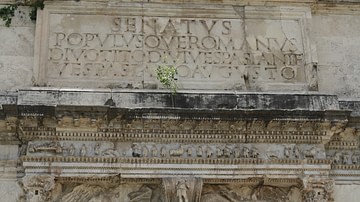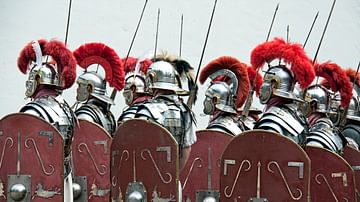Search
Did you mean: Roman Sculpture?
Search Results

Article
Roman Citizenship
Citizenship is and always has been a valued possession of any individual. When one studies the majority of ancient empires one finds that the concept of citizenship, in any form, was non-existent. The people in these societies did not and...

Article
Legacy of the Ancient Romans
The legacy of the ancient Romans – from both the time of the Roman Republic (509-27 BCE) and the time of the Roman Empire (27 BCE - 476 CE) – exerted a significant influence on succeeding cultures and is still felt around the world in the...

Article
Fall of the Western Roman Empire
To many historians, the fall of the Western Roman Empire in the 5th century CE has always been viewed as the end of the ancient world and the onset of the Middle Ages, often improperly called the Dark Ages, despite Petrarch's assertion. Since...

Definition
Roman Standard
The Roman Standard (Latin: Signum or Signa Romanum) was a pennant, flag, or banner, suspended or attached to a staff or pole, which identified a Roman legion (infantry) or Equites (cavalry). The Standard of a cavalry unit was emblazoned with...

Definition
Roman Law
Roman laws covered all facets of daily life. They were concerned with crime and punishment, land and property ownership, commerce, the maritime and agricultural industries, citizenship, sexuality and prostitution, slavery and manumission...

Definition
Roman Legionary
The Roman legionary was a well-trained and disciplined foot soldier, fighting as part of a professional well-organized unit, the legion (Latin: legio), established by the Marian Reforms. While major tactical changes appeared during the final...

Definition
Roman Invective
Roman invective (uituperatio lat.) was the rhetorical and literary genre that aimed at systematically and publicly blaming a political foe to set him aside from the whole community and turn the audience against him during judicial, forensic...

Article
Education in Roman Spain
There was no compulsory state education for children in any of the western provinces of the Roman Empire. The primary sources are sparse when it comes to the education in Roman Spain, and while some scholars argue for a network of schools...

Definition
Mauretania
Mauretania was an ancient kingdom in northwest Africa, encompassing regions of modern-day Morocco and Algeria. Although it shares a name with the modern country of Mauritania, they do not overlap. Ancient Mauretania was named after the Mauri...

Definition
Roman Egypt
The rich lands of Egypt became the property of Rome after the death of Cleopatra VII in 30 BCE, which spelled the end of the Ptolemaic dynasty that had ruled Egypt since the death of Alexander the Great in 323 BCE. After the murder of Gaius...